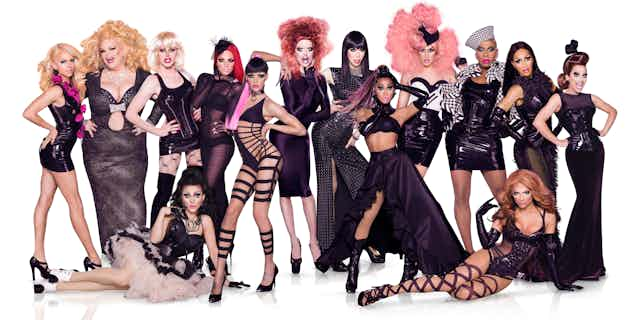A siren sounds in the workroom and the contestants, still in their street clothes, stop their conversation. “Oooh, girl! You’ve got She-Mail,” says a shrill voice. For those of you just tuning in, you’re in for a treat. RuPaul’s Drag Race is a recent “reality” television show that focuses on an elimination contest to find a yearly “America’s Next Drag Superstar”. There’s more here than just another reality show: how these queens use language is unlike anything you have heard before.
The show itself follows many of the conventions of reality television, but is more inclusive and less vitriolic than many of the shows that have come before it. One of its most intriguing aspects is the distinctive speech of the queens. Not only does it include a host of slang peculiar to drag queens, who are “fishy”, “fierce”, and sometimes “throw shade”, but there are some other subtle things going on with how Ru and the other queens speak that is worth paying attention to.
Before we get to the complex stuff, let’s start with the basics. Ru doesn’t make it hard on viewers who may or may not have any experience with the terminology at play. You don’t have to come into the show knowing what “throwing shade” is, but it doesn’t hurt. Some of these terms have a life and history of their own – many come out of the post-Stonewall New York drag scene where drag “houses” competed with each other in rented spaces for trophies.

According to legendary New York queen Dorian Corey, a drag house is like a drag street gang, but a little more like a chosen family, complete with a drag matriarch who looks out for her “children” in the house.
The show emulates the New York drag scene of old, when queens would walk the floor in categories like “Femme Realness” and “Butch Queen First Time in Drags at a Ball”. Terms like “realness” point to the possibility for drag performances to be so “real” that it is impossible to tell a “real” woman from a performance of one.
And then a “fishy” queen is a queen with a body that is effortlessly feminine: she has the wide hips, shapely hands, and curves of a “woman”. Being fierce is another high compliment to pay a fellow queen; fierceness is, seemingly, a mix of self-confidence, attitude, and ability combined in a way that brooks no argument.
Reading, or to get a “read” on someone, is to find that flaw or insecurity that they might try to hide and humorously comment on it. As Ru says: “Get out your library cards, cuz reading is fundamental!” Being a marginal community, in gay and straight society, queens have developed and honed the ability to banter, one-up, and disrupt critics through the magic of “reading”. So when Season four contestant Willam says “Chad Michaels you so old you still on Myspace.com”, she is making a good “read”.

But there’s more going on here than distinctive slang, funny one-liners, and witty repartee. Here there’s a much deeper type of linguistic play inherently tied up in gender and identity. Even the show’s tagline reflects a kind of linguistic drag: “Gentlemen, start your engines, and may the best … woman win.” Addressed to gentlemen, by the end of the sentence we have seen them transform into women. The way that the line is performed, however, lets even the least perceptive viewer into the joke, that these are both women and “women” men and “men”.
In one episode of the show – from the second season – the queens do a drag photo shoot as both the bride and the groom, a performance that highlights that masculinity and manhood aren’t intrinsic to male bodies. Ru and her “drag racers” let us into some of the insights of drag performers: that gender, and sexuality for that matter, are made up out of how we move and act and treat one another. Man and woman, gay and straight, are so well-constructed for some of us that we even begin to think that they are a natural part of our body and identity.
So don’t write off RuPaul’s Drag Race as just another reality television show. Instead, give it a chance to illuminate how intimately linked performance is to our sense of self. While that may seem like a pretty deep insight for a show about catty queens competing for fabulous prizes, don’t worry – these queens are fierce enough to pull it off, and even entertain you along the way.

